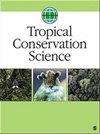Presence And Temporal Activities Of Serrated Hinged Terrapin (Pelusios sinuatus) And Marsh Terrapin (Pelomedusa galeata) In KwaZulu-Natal, South Africa, Assessed Using Telemetry
IF 1.6
4区 环境科学与生态学
Q2 BIODIVERSITY CONSERVATION
引用次数: 1
Abstract
Background and Aims For the first time in Africa, two freshwater turtle species (hereafter terrapin) presence and temporal activity in their habitats were investigated using radio telemetry. Methods Telemeter tags were attached to Pelusios sinuatus (n = 10) at Ndumo Reserve and Pelomedusa galeata (n = 10) at Tala Reserve. Pelusios sinuatus tagged individuals were monitored between August–December 2016 at Ndumo, while P. galeata individuals were monitored between November 2017–July 2018 at Tala. Sensors on the tag determined the tag temperature and temporal activity. We examined both species' frequency distributions of inactivity to time of day. Activity trends for both species in comparison with ambient temperature and tag temperature were analyzed. Results Tags showed individuals presence or absence as detected by fixed remote networks at the study sites. Tagged P. sinuatus in Ndumo disappeared after a flood without returning after the flood receded. Both species were diurnal, with P. galeata showing a greater ability to maintain tag temperature above ambient temperature in the first 10 h of a day than P. sinuatus. Climatic data, including ambient temperature, rainfall, and wind, were retrieved from weather stations. The most significant climatic variable that affected activity was ambient temperature. Rainfall also showed a significant effect, but wind showed no significant effect. Implications for Conservation This method can become a valuable tool for long-term remote monitoring of other semi-aquatic reptiles in wetlands that are increasingly under anthropogenic and climatic pressure. Thus, its implications for conservation are significant.使用遥测技术评估南非夸祖鲁-纳塔尔岛锯齿状铰链Terrapin(Pelusios sinatus)和沼泽Terrapin(佩洛美杜莎galeta)的存在和时间活动
背景和目的首次在非洲使用无线电遥测技术调查了两种淡水龟(以下简称水龟)在其栖息地的存在和时间活动。方法对Ndumo保护区的Pelusios sinuatus(n=10)和Tala保护区的Peromedusa galeta(n=10。2016年8月至12月,在Ndumo对Pelusios sinuatus标记个体进行了监测,而2017年11月至2018年7月,在Tala对P.galeta个体进行了监控。标签上的传感器确定了标签的温度和时间活动。我们研究了这两个物种在一天中不活动的频率分布。分析了与环境温度和标签温度相比,这两个物种的活性趋势。结果标签显示了研究地点固定远程网络检测到的个体存在或不存在。Ndumo的标记P.sinuatus在洪水后消失,洪水退去后没有回来。这两个物种都是昼夜活动的,在一天的前10小时内,方头蟾蜍比正弦蟾蜍更能将标记温度保持在环境温度以上。气候数据,包括环境温度、降雨量和风力,都是从气象站获取的。影响活动的最重要的气候变量是环境温度。降雨也显示出显著的影响,但风没有显示出显著影响。对保护的影响这种方法可以成为长期远程监测湿地中其他半水生爬行动物的宝贵工具,这些爬行动物正日益受到人为和气候压力的影响。因此,它对保护的影响是重大的。
本文章由计算机程序翻译,如有差异,请以英文原文为准。
求助全文
约1分钟内获得全文
求助全文
来源期刊

Tropical Conservation Science
BIODIVERSITY CONSERVATION-
CiteScore
3.60
自引率
5.90%
发文量
16
审稿时长
>12 weeks
期刊介绍:
Tropical Conservation Science is a peer-reviewed, open access journal that publishes original research papers and state-of-the-art reviews of broad interest to the field of conservation of tropical forests and of other tropical ecosystems.
 求助内容:
求助内容: 应助结果提醒方式:
应助结果提醒方式:


